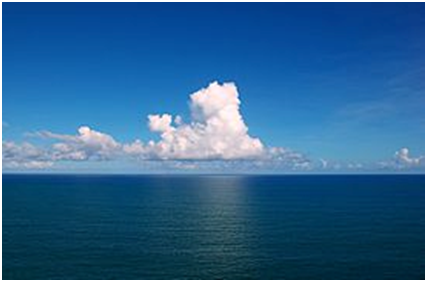by Asma Mahdi
Steward of the Waters
They say many people have a calling in life. Well, I knew from a very young age that my calling was to protect the ocean.
Growing up near the water influenced my decision to pursue a livelihood where I get to be an ocean khalifa, an ocean steward, day in and day out. But there is more to it than just that. Being near water is where my heart is most calm, where I can really focus my thoughts, dissipate most of my concerns, and feel a sense of rejuvenation unlike anywhere else in the world. Soul filling — that’s what it is.
 The Atlantic Ocean – Photo: Wikipedia
The Atlantic Ocean – Photo: Wikipedia
It’s the place where I feel a spiritual connection unlike any other. Granted, I have yet to travel to Mecca, the most sacred place in Islam. To date, the ocean is probably the closest I’ve been to feeling that connection. To know that I’m amongst a pure form of God’s creation, though it doesn’t entirely go untouched or unharmed by human impact, is one of the most nourishing spaces for me to make that connection – it’s my mosque.
In the past year, I found myself using my passion as way to steer my ummah, my community, towards caring for the planet and rekindling a spiritual connection taught through the Qur’an and Prophet Muhammad’s (PBUH) prophetic teachings.
Caring for the Planet
Having worked in the realm of environmental science for more than a decade, I know that it will take more than just facts, trajectory charts, and the intensification of extreme weather events to help bring the world to understand the very real impacts human activity is having on our one-planet. It’s going to take faith, and it’s going to take faith to change.
Climate change is one of the biggest threats our generation faces. It’s the driving force behind hotter summers, colder winters, and more frequent severe weather events. It is global in impact and touches every faith known to mankind. To prevent it, we have to come at this with a global solution as a united front working across and within our respective faiths towards saving the one resources we're all connected to – Earth.
For Muslims, there’s a call to live in balance with the environment. The Qur’an states, “It is He who has appointed you guardians in the earth, and has raised some of you in rank above others, that He may try you in what He has given you. Surely your Lord is swift in reckoning; and surely He is All-Forgiving, All-Compassionate” (6:165). Prophet Muhammad (PBUH) also stated, “the earth is green and beautiful and Allah has appointed you his stewards over it.” (Hadith – Muslim). We are entrusted to be caretakers and have a responsibility to our faith to commit to changing our habits, to take responsibility for our impacts, and to protect our planet.
Nearly 1.6 billion Muslims live along the middle belt of the planet. And, Muslim-majority countries are among the most vulnerable to climate change. The risks are many: massive displacement in Bangladesh; flooding of Indonesian islands; starvation in the Sudan; water and agriculture crises across the Middle East.
The Maldives is an archipelago of more than 1,000 islands and 350,000 people off southern India. It’s the world smallest nation and a Muslim majority country. At its highest point, it sits only 2.4 meters (approximate 8 feet) above sea level – dolphins can jump higher than that. With sea levels set to rise, potentially 10 feet within the next 50 years, we may witness the first country that will lose its national identity because of climate change. And as a result it may be the first country that yields “environmental refugees.”
According to climate scientists, by 2050, rising sea levels will inundate approximately 17 percent of the land and displace about 18 million people.
In 2014, nearly half a million people were left homeless after mass flooding in Bangladesh. Bangladesh relies almost entirely on groundwater for drinking water because the rivers are so polluted. Pumping ground water causes the land to settle because it depletes the water table, and as a result, cities sink. So as sea levels are rising, Bangladesh’s cities are sinking, increasing the risks of flooding.
Islam is inextricably linked to the environment. For me, respect for God’s creation also translates into a duty to protect and sustain one of His most beautiful creations, planet Earth, and also have Muslims and people of all faiths across the world care for creation and care for our common home.
We’re only given one planet. As stewards, we have a duty to strive for its safekeeping. And as a Muslim, I have to be more mindful of our impact and the environmental legacy I want to leave behind because of the Amana – or trust – that has been bestowed upon me. Protecting the ocean is one way I grew to show that trust, and now I feel the need to share the understanding of that trust because it will take a collective voice to help halt a changing climate.
Asma Madhi is on the Board of Directors of Green Muslims, an organization that serves as a source in the Muslim community for spiritually-inspired environmental education and action. She co-created Green Muslims’ “Our Deen is Green” youth outdoor education program. She’s a marine conservationist by training who currently works on preventing one of the biggest threats our oceans face today – marine debris.”
